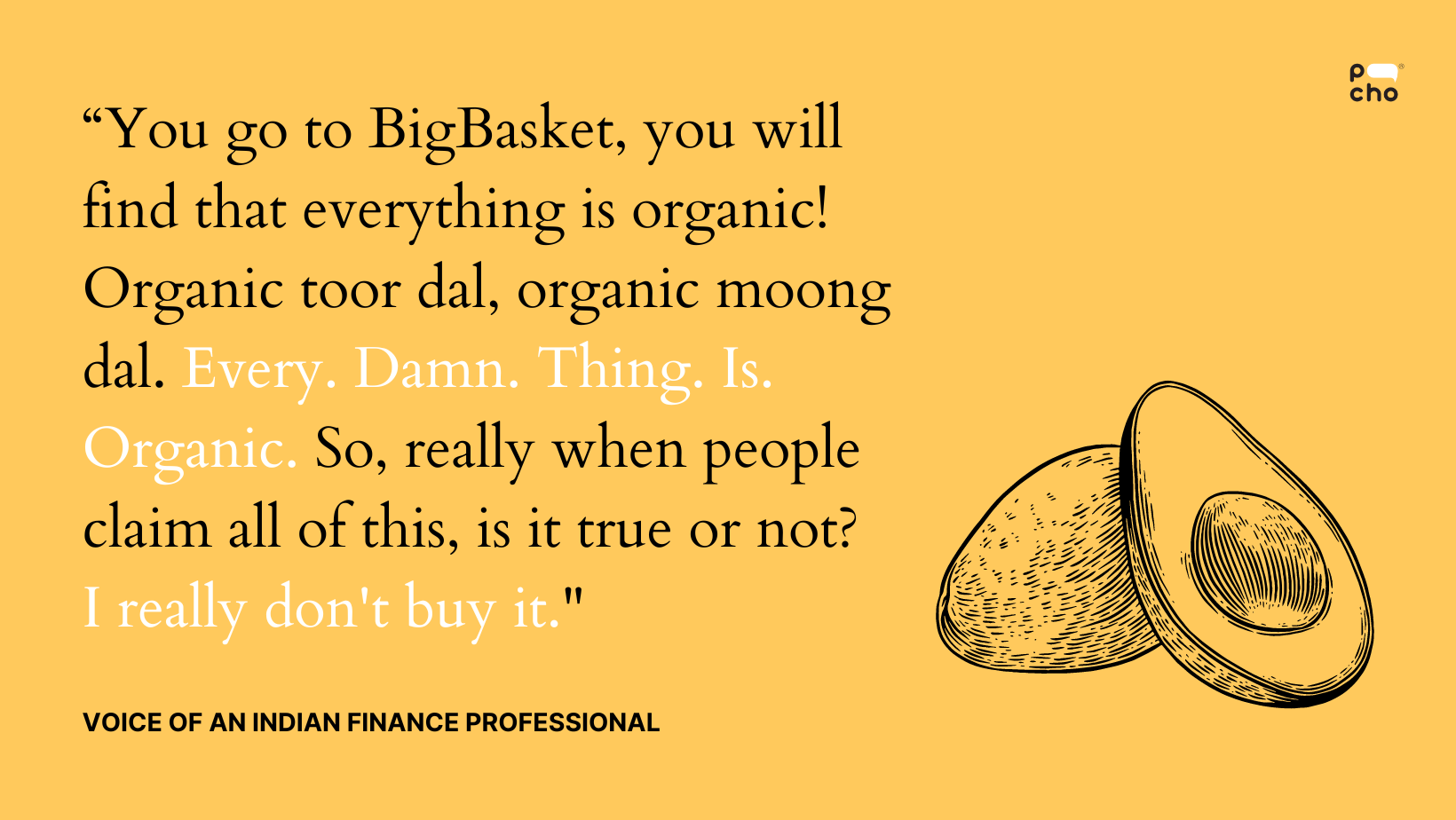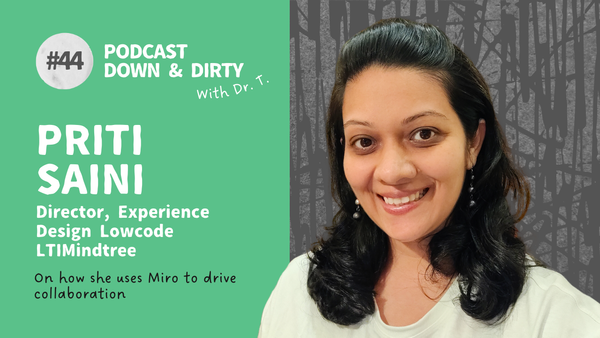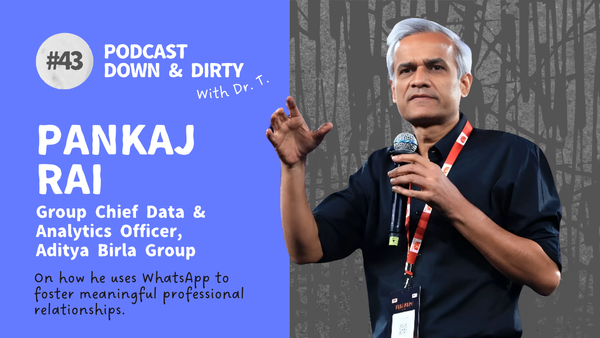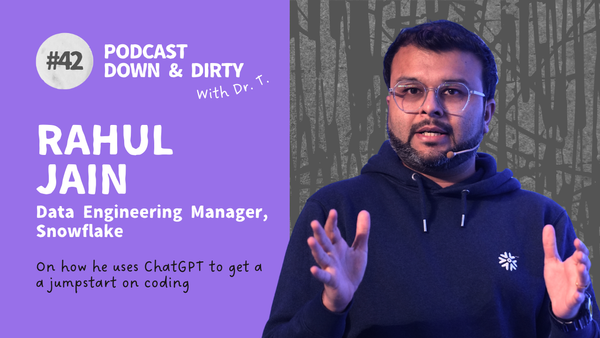💬What's the deal with organic anyway?
Agastya Fernandes, a health-conscious Millennial dad, echoes what avocado fiends in India are thinking.

Written by: Swasti Acharya
An average Millennial working his not-so-average six figure banking job in the commercial district of Mumbai’s BKC, Agastya Fernandes’s* life is every aspiring investment banker’s dream. He stays fit, spends time with his family and dogs, and even cares about the environment.
For Agastya and his busy weekday life, going to the gym and exercising gives him time to blow off steam and weekend outings allow some respite. Despite this, he’s extremely conscious of his diet and tries his best to avoid processed food, preservatives and added sugar.
The ‘wellness’ generation
“I wouldn't count carbs to be honest. There are people who would actually sit and count. I'm not the counting variety but at least, I'm mindful of that unnecessary oily stuff. Maida (refined flour), for instance, I avoid. So like yesterday at Hitchki, I only had paneer tikka and some salad along with it. I avoid the fried stuff typically. But a peanut butter is okay, given that it's more natural.”
Like Agastya and his wife, Miillennials and GenZ are being called the ‘Wellness Generation’ who actively seeking wellness in their daily lives by eating healthier, exercising more, and smoking less compared to previous generations. For nearly 50% of them, healthy eating is a way of life rather than a temporary diet goal. Thanks to technology, we have access to a wealth of wellness information and tools for monitoring our personal health, right at our fingertips.
“As principal at home, we don't use white sugar. We only go for brown sugar kind of thing. There are brands who are like ‘organic’ brown sugar, then we're like okay fine we'll go with an organic brown sugar…. that way. So we won't compromise on the main need that we have. We'll go with the brown sugar only.”
They’re not alone in the health-conscious population weary of healthy sugar alternatives. It’s said that the market for this molasses covered sugar is going to grow at a CAGR of 8.3% in the next 5 years.
But it’s not just about his gym habits and desire to stay fit. Since he lives with his aging parents and a young daughter, his justification is a concern for their health. His father has high blood sugar blood pressure so as a household, they’ve incorporated these dietary habits gradually over a decade or so. It's a slow transformation which happened and now it's become part of life.
Organic is a fad
Organic food is a trend or much needed intervention – whatever you’d like to call it – it’s here to stay.
Agastya confesses, “To be honest, I think it's a fad.” Sounding more annoyed as he thinks about it, the volume picks up: “Every damn thing you pick up nowadays on the shelf will say organic this, organic that.” It’s true. “Organic” is in your neighbourhood grocery store that’s stocking kale chips or guilt-free soya katori as well as your upscale vegan cafe that lures you in with its Nordic interiors.
There’s a lack of transparency despite the perceived breezy open-ness.
“Nobody has any idea of where it is coming from. So I don't have any idea if it's genuinely being sourced and if it's actually true… then, yes, I would tend to lean towards that. But now, every other thing you find is that, right? You go to BigBasket, you will find that everything is organic! Organic toor dal, organic moong dal. Every. Damn. Thing. Is. Organic. So, really when people claim all of this, is it true or not? I really don't buy it.”
In addition to this, Agastya’s guacamole craving or avocado toast is not as easy to prep as expected. “I like avocados. A lot of times they are there [in the market] but then, the quality will not be good or they'll say stock is not there. That’s something on my mind too. The freshness of some of these non-Indian or non-Indian origination ingredients where the supply chain is not yet there.” Much is left to be said about the homegrown Indian avocado that retails at one third of the imported and its resilience in the local climate of Maharashtra, Tamil Nadu, and Kerala.
Ain’t no avocado organic enough
Today, India’s organic food market is at an estimated $1.2M and will grow to $4.6M in 2028. However, telltale signs in lack of regulation, authenticity, and questionable manufacturing standards are a major roadblock in its successful growth.
While some people may see it as a fad, others see it as a necessary shift towards more sustainable and healthier food choices. Indian agriculture has a long history of organic farming, with traditional farming practices that rely on natural inputs, crop rotations, and intercropping even without being branded as ‘organic’. However, the incorporation of chemical inputs and monoculture in the Green Revolution years has left us without a transparent process of verifying what is truly organic.
*We anonymize participant names to protect their identities and encourage more honest dialogue.



